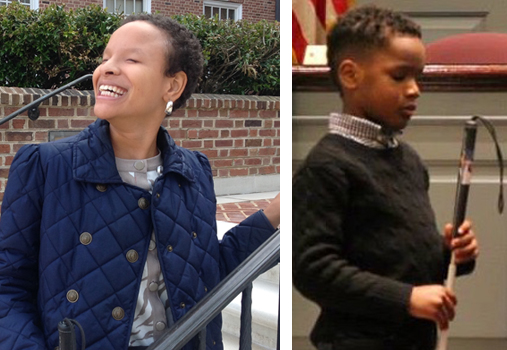A way forward for students with blindness
By Debbie Harrington

Elizabeth Harrington (left) and Xavier Lawrence inspired legislators to take a stand on their education.
At long last, The First State may be poised to do the right thing where its students with blindness are concerned.
Presently, a 12-month academic program is not provided to all secondary school students with disabilities in Delaware. According to DE Title 14 section 1703(e), only those students with severe mental disability, trainable mental disability, autism, traumatic brain injury, deaf-blindness or a limited orthopedic disability are entitled to a 12-month secondary school education program, with appropriately allotted funding.
This puts students who are blind or visually impaired at a disadvantage. That’s because from the get-go, any number of them are, potentially, having to make their way through school with an 80 percent learning deficit, given that 80 percent of learning is, according to researchers, visually accomplished. Yet, unlike the students with disabilities I mentioned at the top of this post, students with blindness have to demonstrate cause to receive an extended school year (ESY). And that’s not something many parents or guardians of children with blindness are able to establish to the satisfaction of education officials.
Now, though, there’s reason for encouragement. The final report to the DE 148th General Assembly on Senate Concurrent Resolution #2 to study education for the blind and visually impaired made the recommendation on June 30 to include blindness among the disabilities that are guaranteed the 12-month academic entitlement.
Much of the credit for that long-overdue recommendation goes to two students who are blind and visually impaired: Elizabeth Harrington and Xavier Lawrence, respectively. They inspired legislators to take a stand on their education.
Now, it’s up to the Delaware Department of Education to begin the legislative process to change the Title 14 Education Code so that it reflects the recommendation. Parents and guardians of students with blindness, and, most especially, the students themselves, shouldn’t be made to wait any longer.


Comments